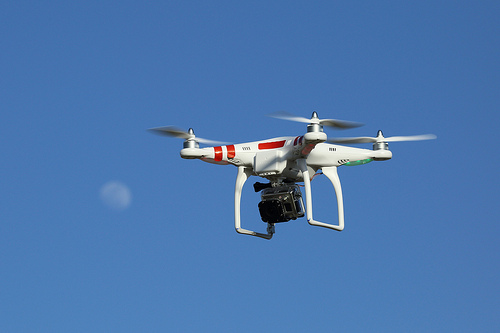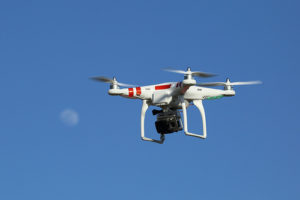While lawmakers may spend the better part of the next year (or longer) debating who rules the drone-filled skies of America, those on the ground will be jockeying for position at the remotes. Drones of all types, but mostly those equipped with cameras, have become increasingly popular as a cheap mode of air transport or entertainment. So the big question is, how can you get a drone job in 2016? Here are some places to start looking:

Package Delivery
In 2014, Amazon announced it was exploring drone delivery for its packages. Shortly after, it put out a job listing for a drone pilot. While the listing isn’t active any longer (it was filled in early 2015), the requested qualifications give some insight into skills you’ll need to make it in tomorrow’s go-go drone pilot market. Experience (in terms of 4+ years) of drone piloting, with a bonus if you have actual airplane pilot experience as well, is helpful.
Movie Filming
A lot cheaper than an hourly helicopter rental, and easier to zip into small, urban, or even remote spaces, drones plus small HD video cameras (think GoPro) are a match made in cinematic heaven. (Just check out this homage to Chicago, below.) Just practice a lot before you get close to areas you’re not supposed to crash a drone, like the White House or a skiing competition.
Agriculture
Drones have immense potential for easily gathering data on crops throughout the season. Want to survey acres of crops from the comfort of your front porch? Got it. Want to see where your cattle are across that ridge? Keep the horse in the barn, the drone is on it. Check moisture, diseases, storm damage, and more all with the help of your handy flying robot device. And because farms are mostly in isolated countryside, farmers don’t have to worry about peeping in anyone’s windows or violating any privacy laws. Forbes noted back in May that “the legalization of commercial drones will create more than $80 billion in economic impact (such as revenue, job creation) between 2015 and 2025, and that precision agriculture will provide the biggest piece of that growth.”
Utilities
The Wichita Lineman may be able to sleep in one day, thanks to drones. Companies can use remote aircraft to survey storm damage and look for downed lines without trying to thread a giant truck through fallen trees and debris. Or, solar companies can use drones to find that one damaged panel in a sea of sun-sucking energy makers. Once deemed safe by the FAA, drones could be making renewable resources less expensive to consumers, as well as adding some cool jobs.
Real Estate
Have an attractive tract of land you’d like to promote to a buyer out of the state (or even the country)? Make a lovely drone video of it and post it online! It doesn’t even have to be a video of your country estate, as long as you follow all local laws regarding video-enabled drones, and make sure you’re not taking any nude beach videos. Smaller-sized real estate listings have had some success with drone footage, especially in competitive markets.
Military
We’d be remiss to not mention military drone jobs in this list. Some of the most controversial drone uses are by the military. Often these very large drones are used for either surveillance or bombing runs, and of course, they come with a load of potential moral baggage as well. We could probably fill the comments section debating the positives or negatives of military drones, to no real avail. Still, the military is hiring.
—
To get training for these jobs, try the also growing field of drone certification programs. As national rules change with the FAA, the best way to stay abreast of changes is through accredited programs. The University of North Dakota offers a B.S. in Aeronautics with a Major in Unmanned Aircraft Systems Operations and has been offering the program since 2008, showing some stability in the field. The University also recently received a $350,000 grant for drone data collection and research related to agriculture.
Are you a drone pilot? Add your job to our PayScale Salary Survey!
Tell Us What You Think
Would you be up for piloting a drone for work? We want to hear from you! Leave a comment or join the discussion on Twitter.


